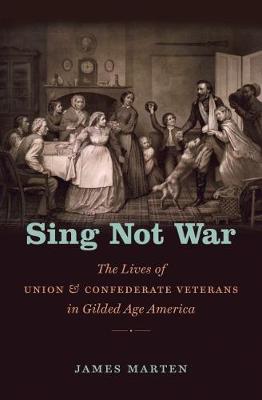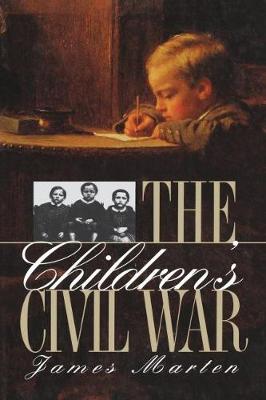Civil War America
2 total works
After the Civil War, white Confederate and Union army veterans reentered--or struggled to reenter--the lives and communities they had left behind. In Sing Not War, James Marten explores how the nineteenth century's ""Greatest Generation"" attempted to blend back into society and how their experiences were treated by nonveterans.
Many soldiers, Marten reveals, had a much harder time reintegrating into their communities and returning to their civilian lives than has been previously understood. Although Civil War veterans were generally well taken care of during the Gilded Age, Marten argues that veterans lost control of their legacies, becoming best remembered as others wanted to remember them--for their service in the war and their postwar political activities. Marten finds that while southern veterans were venerated for their service to the Confederacy, Union veterans often encountered resentment and even outright hostility as they aged and made greater demands on the public purse. Drawing on letters, diaries, journals, memoirs, newspapers, and other sources, Sing Not War illustrates that during the Gilded Age ""veteran"" conjured up several conflicting images and invoked contradicting reactions. Deeply researched and vividly narrated, Marten's book counters the romanticized vision of the lives of Civil War veterans, bringing forth new information about how white veterans were treated and how they lived out their lives.
Many soldiers, Marten reveals, had a much harder time reintegrating into their communities and returning to their civilian lives than has been previously understood. Although Civil War veterans were generally well taken care of during the Gilded Age, Marten argues that veterans lost control of their legacies, becoming best remembered as others wanted to remember them--for their service in the war and their postwar political activities. Marten finds that while southern veterans were venerated for their service to the Confederacy, Union veterans often encountered resentment and even outright hostility as they aged and made greater demands on the public purse. Drawing on letters, diaries, journals, memoirs, newspapers, and other sources, Sing Not War illustrates that during the Gilded Age ""veteran"" conjured up several conflicting images and invoked contradicting reactions. Deeply researched and vividly narrated, Marten's book counters the romanticized vision of the lives of Civil War veterans, bringing forth new information about how white veterans were treated and how they lived out their lives.
Children--white and black, northern and southern--endured a vast and varied range of experiences during the Civil War. Children celebrated victories and mourned defeats, tightened their belts and widened their responsibilities, took part in patriotic displays and suffered shortages and hardships, fled their homes to escape enemy invaders and snatched opportunities to run toward the promise of freedom.
Offering a fascinating look at how children were affected by our nation's greatest crisis, James Marten examines their toys and games, their literature and schoolbooks, the letters they exchanged with absent fathers and brothers, and the hardships they endured. He also explores children's politicization, their contributions to their homelands' war efforts, and the lessons they took away from the war. Drawing on the childhoods of such diverse Americans as Jane Addams, Booker T. Washington, and Theodore Roosevelt, and on sources that range from diaries and memoirs to children's amateur newspapers, Marten examines the myriad ways in which the Civil War shaped the lives of a generation of American children.
An original-minded, skillfully and suggestively presented history, haunting in its detailed unfolding of a war that put so many already vulnerable youngsters in danger, but elicited from some of them, as well, impressively sensitive, responsive thoughts, gestures, and deeds in what became, as this extraordinary book's title insists, their civil war.--Journal of American History
James Marten's thoroughly researched and engagingly written study . . . stands as one of the most exciting studies to emerge in the last dozen years. . . . Marten has taken a topic ignored by both Civil War historians and historians of childhood and crafted an engaging, masterful, nuanced, and readable study that will not quickly leave the reader's mind or heart.--American Studies
The first comprehensive account of Civil War children. . . . Thoroughly researched and nicely illustrated, The Children's Civil War will be a touchstone for historians and generalists who seek to gain a fuller understanding of life on the home front between 1861 and 1865.--Civil War History
The Children's Civil War is a poignant and fascinating look at childhood during our nation's greatest crisis. Using sources that include diaries, memoirs, and letters, James Marten examines the wartime experiences of young people--boys and girls, black and white, northern and southern--and traces the ways in which the Civil War shaped the lives of a generation of American children.
Offering a fascinating look at how children were affected by our nation's greatest crisis, James Marten examines their toys and games, their literature and schoolbooks, the letters they exchanged with absent fathers and brothers, and the hardships they endured. He also explores children's politicization, their contributions to their homelands' war efforts, and the lessons they took away from the war. Drawing on the childhoods of such diverse Americans as Jane Addams, Booker T. Washington, and Theodore Roosevelt, and on sources that range from diaries and memoirs to children's amateur newspapers, Marten examines the myriad ways in which the Civil War shaped the lives of a generation of American children.
An original-minded, skillfully and suggestively presented history, haunting in its detailed unfolding of a war that put so many already vulnerable youngsters in danger, but elicited from some of them, as well, impressively sensitive, responsive thoughts, gestures, and deeds in what became, as this extraordinary book's title insists, their civil war.--Journal of American History
James Marten's thoroughly researched and engagingly written study . . . stands as one of the most exciting studies to emerge in the last dozen years. . . . Marten has taken a topic ignored by both Civil War historians and historians of childhood and crafted an engaging, masterful, nuanced, and readable study that will not quickly leave the reader's mind or heart.--American Studies
The first comprehensive account of Civil War children. . . . Thoroughly researched and nicely illustrated, The Children's Civil War will be a touchstone for historians and generalists who seek to gain a fuller understanding of life on the home front between 1861 and 1865.--Civil War History
The Children's Civil War is a poignant and fascinating look at childhood during our nation's greatest crisis. Using sources that include diaries, memoirs, and letters, James Marten examines the wartime experiences of young people--boys and girls, black and white, northern and southern--and traces the ways in which the Civil War shaped the lives of a generation of American children.

